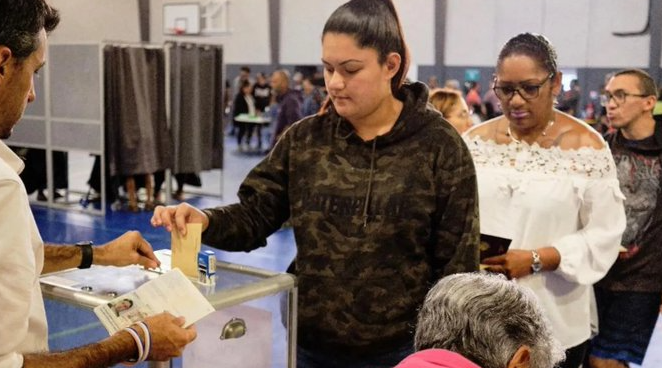France is at a pivotal moment as it heads into a parliamentary election that could reshape its political landscape, with the far-right National Rally (RN) led by Marine Le Pen and Jordan Bardella surging closer to power than ever before in modern times.
The National Rally’s momentum follows their recent victory in European elections, prompting President Emmanuel Macron to swiftly call for a national vote, catching the country off guard.
Also Read: Hurricane Beryl Strengthens, Caribbean on High Alert
A high turnout is anticipated among France’s 49 million voters for this critical election, with polls closing in major cities at 20:00 (18:00 GMT) and the first exit polls expected shortly thereafter.
This election spans two rounds, with most of the National Assembly’s 577 seats to be decided in a runoff vote next Sunday.
The abbreviated 20-day campaign has favored the RN, allowing them to sharpen their focus on immigration, security, and tax cuts amidst a cost-of-living crisis.
Jordan Bardella, eyeing the role of RN’s first prime minister, expresses confidence in winning numerous constituencies outright in the initial round. However, his condition for assuming office hinges on securing an absolute parliamentary majority of 289 seats, avoiding a hung parliament and potential stalemate.
As the first results roll in on Sunday evening, opponents of the National Rally will strategize to unify against them in runoff battles across France, aiming to prevent an outright majority.
The runoff scenarios are likely to pit the National Rally against a hastily assembled left-wing alliance dubbed the New Popular Front, which harbors ambitions of securing a surprise victory. Analysts predict that up to three parties could qualify for second-round battles in approximately 250 constituencies.
Historically, parties across the political spectrum have united to thwart the far-right’s ascent, raising speculation about potential alliances and tactical withdrawals to consolidate anti-RN votes.
RN leaders have worked tirelessly to shed their extremist image, proposing policies such as prioritizing French citizens for jobs and housing, cutting VAT on energy, and adjusting income tax thresholds for young adults.
In Franconville, north of Paris, voter Agnès supports Bardella’s proposals for stricter discipline in schools, citing concerns about deteriorating order. She is considering voting right or far-right due to Bardella’s charisma and policies.
President Macron’s Ensemble alliance faces predictions of significant losses, jeopardizing Prime Minister Gabriel Attal’s tenure despite his enduring popularity. Critics argue that Macron’s decision to call early elections—three years ahead of schedule—has disrupted France’s focus, especially amidst preparations for the Paris Olympics starting July 26.
Security concerns loom large as police and military resources are stretched thin, with warnings of potential unrest following the election’s conclusion.
Macron’s strategy, termed “ni-ni” (neither-nor), emphasizes his alliance as the sole bulwark against both the extreme right and left. He argues that the far-right categorizes individuals by their background, while the left assesses them by their community, highlighting the ideological battleground at stake.
As France awaits the election’s outcome, political uncertainty grips the nation, underscoring the high stakes of this landmark parliamentary contest.



